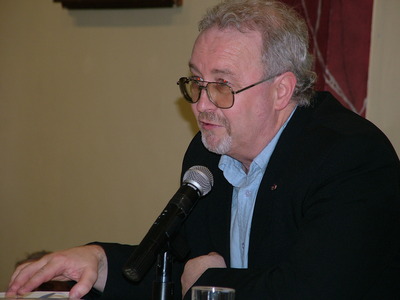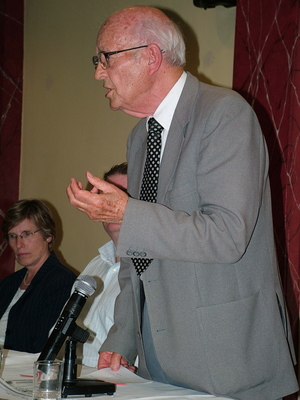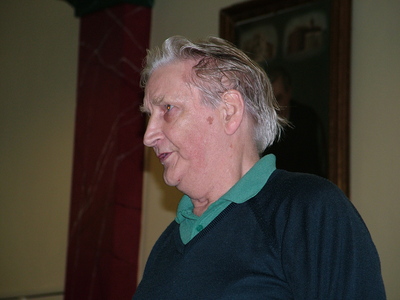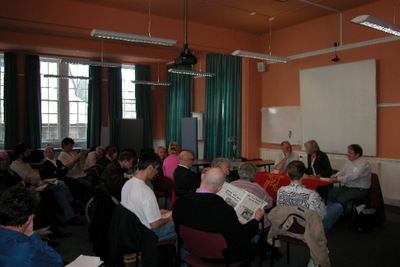Connolly's life celebrated in London and Edinburgh
by David Granville
SUPPORTERS OF Irish freedom and social justice gathered in Edinburgh and London in mid-May to hear tributes in speech and song to the life and work of the great Irish labour leader and revolutionary James Connolly, executed by the British authorities on 12 May ninety years ago for his part in the Easter Rising of 1916.
Connolly, a signatory to the proclamation of the provisional government of the Irish Republic, was leader of the Irish Transport and General Workers Union and the military commander of the Irish rebel forces during the rising.
The commemorative events, which were attended by over 130 people, were organised jointly by the Connolly Association and the Communist Party of Britain.
The London commemoration, held at the Irish Centre in Camden Town, opened with sad news of the death, earlier that day, of leading Irish communist and former International Brigader Michael O'Riordan.
O'Riordan, who was national chair of the Communist Party of Ireland, a former general secretary of the CPI and a IRA activist in the 1930s and 40s, was among those Irishmen to have fought in defence of the Spanish Republic during the civil war in 1936.
Paying tribute to O'Riordan's internationalism and lifelong struggle for socialism and Irish freedom, Connolly Association general secretary Jim Redmond called for a minute's silence in his honour.
It was particularly fitting that Bob Doyle, the last surviving Irishman to have fought alongside Mick O'Riordan against Franco's fascist insurgents was among those present at the meeting.
Unfortunately, O'Riordan's death prevented current CPI general secretary Eugene McCarten from speaking as planned.
Stepping into the breach, Communist Party of Britain general secretary Robert Griffiths recalled the influence that Connolly's writings had had on him in his 20s when he had been a young left-wing Welsh republican. Griffiths also pointed to the vitality and relevance for today of many of Connolly's writings.

Drawing parallels with the modern-day actions of Britain and the USA in Iraq and Afghanistan, Griffiths recalled how in A War for Civilisation, written in the midst of the slaughter of the first world war, Connolly had poured scorn on imperialist war.
"He refers of 'a war for civilisation' which invades and occupies independent countries because they refuse to be dependant; a war for civilisation which bombards defenceless towns; which demands of its own people - in the name of freedom - that they give up long-fought-for freedoms such as free speech, freedom of action, trial by jury and the freedom to combine and fight in their trade unions."He wrote of a war for civilisation which - in the name of the struggle against militarism - militarises both the conquered and the conquering country; a war for civilization in which the capitalist class proclaims the virtues of patriotism, while dragooning and fooling the working class to fight and die for capitalist profit."
However, Connolly, had gone further by exposing the 'patriotism' of the capitalists for the brutal self-interest that it always is and by warning, as Marx had done before, that by swallowing ruling-class propaganda, the working class only reinforced its own enslavement.
"As politically conscious, class-conscious and nationally conscious man, Connolly counterposed to capitalist patriotism the concept of working class patriotism - a patriotism which stood for the interests of the great majority of the nation, namely the working class, and above all the interest of that class to abolish class exploitation and all forms of oppression including that of nations and of women."
Connolly's concept of patriotism, which was perfectly compatible with working-class or socialist internationalism, was given even sharper focus, he insisted, by the fact that the working class in Ireland was exploited by both British and native Irish capitalists, within the context of Britain's occupation of Ireland.
"Its value is that it takes full account of specific national conditions and sensitivities; it is rooted in reality, while separating the reactionary from the progressive. But it also recognises and embraces the international context, upholding international solidarity and the universal character of humanity,"
Former Labour Party general secretary Jim Mortimer stressed that Connolly's life had been a model of the importance of study and ideas for the progressive movement. "Although Connolly had a humble upbringing and limited formal education, he studied all his life. He was a theorist who was also an activist," he said.

He had learned three important lessons from Connolly, he told the audience: that the relationship between the struggles for national independence and socialism in the period of imperialism were complementary rather than antagonistic; that while the working class remained the main engine for change in the struggle for socialism, many allies could be won who were not from that class; and that trade unions were vital to the development of class consciousness and working-class solidarity in the face of the ruthless exploitation of the bosses under capitalism.
These lessons were as applicable today as they had been in Connolly's time, he said.
"There is a struggle on a world scale against US imperialism - the main threat to peace in the world. However, people came to that struggle with varying motivation and inspiration," he said.
Challenging those who criticised Connolly for taking part in a 'hopeless adventure', Mortimer stressed that the labour leader was not a reckless revolutionary, but had been prepared to make the challenge in 1916 because of the specific circumstances of the time. Millions had already been slaughtered in the imperialist world war and there was a threat of conscription in Ireland.
In addition, opposition from the House of Lords to the third attempt to get Home Rule passed had only been overcome by use of the Parliament Act. The response of the business and landlord class in the north east of Ireland, supported by a substantial number of army officers and the leadership of the Conservative Party, had been the treasonous threat of armed resistance.
Connolly had clearly acted in accordance with the principle set down by the American anti-colonial revolutionary Thomas Jefferson: "that all people have a constitutional right to challenge government, but when this is denied they have a revolutionary right to seek that objective", he insisted.
The final speaker at the London event, historian and Connolly scholar Priscilla Metscher, provided a fascinating and detailled account of the background and political thinking which led to the Irish labour leader's participation in the Easter Rising of 1916*.
Of all the leaders of the rising, it was the ideas and intentions of Connolly that had been distorted the most, she said.
To some, like his contemporary Sean O'Casey, the playwright and socialist, Connolly "had abandoned socialism for nationalism". For others, Connolly had participated in a "hopeless blood sacrifice" out of which, in the words of the conservative nationalist W B Yeats "a terrible beauty was born" changing "things utterly".
Refuting such misconceptions and distortions, along with the notion that the rebellion had been doomed to failure from the outset, Metscher stressed that many assessments of Connolly's contribution to socialism and the national question had tended to overlook the significance of Connolly as a 'socialist republican'.
"Connolly understood socialism in Ireland as standing in, carrying on and developing the tradition of republicanism established by the United Irishmen," she explained.
He also understood that the struggle for national independence must be connected with the struggle for reorganisation of society on a socialist basis, as his writings from the end of the 19th century clearly indicate. For Connolly, nationalism without socialism was no more than "national recreancy", she reminded the audience.
As Connolly himself had written:
"If you remove the English army tomorrow and hoist the green flag over Dublin Castle, unless you set about the organisation of the socialist republic your efforts would be in vain."
However, she reminded the audience the Irish labour leader had never hesitated to co-operate with nationalists such as Maud Gonne and Arthur Griffiths on issues of concern to socialist republicans.
Again quoting Connolly, she reminded the audience of his attitude to working with nationalists who were not socialists:
"Even when he is from an economic point of view intensely conservative, the Irish nationalist, even with his false reasoning, is an active agent in social regeneration, in so far as he seeks to invest with full power over its own destinies a people actually governed in the interests of a feudal aristocracy."Connolly's decision to join forces with the leaders of the IRB and participate in the Easter Rising, had therefore been a logical step in his political thinking, especially as "the particular political climate created in Europe by the outbreak of the First World War, together with political developments in Ireland, which favoured an alliance of all democratic forces there, forced events in this direction".

In addition to the contributions of the main speakers, the London meeting was treated to Gearoid MaClachlainn recording of Connolly's explanation of why the militant workers of Dublin were raising the Green flag of Ireland over Liberty Hall in April 1916 and Michael MacLiammoir's recording of the Proclamation of The Provisiional Government of Ireland.
The highly successful commemorative event was concluded by a powerful rendition of the Foggy Dew, from the magnificent voice of long-time Connolly Assoiciation member Andy Higgins, who earlier in the proceedings had treated to audience to an equally forceful and moving rendition of James Connolly The Irish Rebel.
- A FURTHER commemorative meeting organised jointly by the Connolly Association and the CPB meeting, held on 13 May in Edinburgh, within 200 yards of Connollly's birthplace, heard Jim Friel, a former Scottish chair of the GPMU and a member of the Connolly Association, discuss the Irish revolutionary's Edinburgh origins.

He told the meeting that the Irish leader's ideas had been forged in the bitter poverty of working class Edinburgh life and in the trade union struggles of the day for union recognition. Like many other trade unionists then and since, Connolly had faced victimisation by the Edinburgh City Corporation authorities, he insisted.
Joe Bowers, industrial organiser of the Communist Party of Ireland, stressed, despite grave difficulties, Connolly had worked to build trade unions and political organisations because he knew that there was no future for working people unless the existing order was challenged.
"Today, his example and his writings provide us with the confidence that it is still possible to move forward to the emancipation of the working class and put an end to neoliberal capitalism," he told the Edinburgh gathering.
* The full text of Priscilla Metscher's speech can be found on this website at:
Connolly Association, c/o RMT, Unity House, 39 Chalton Street, London, NW1 1JD
Copyright © 2006 Connolly Publications Ltd

